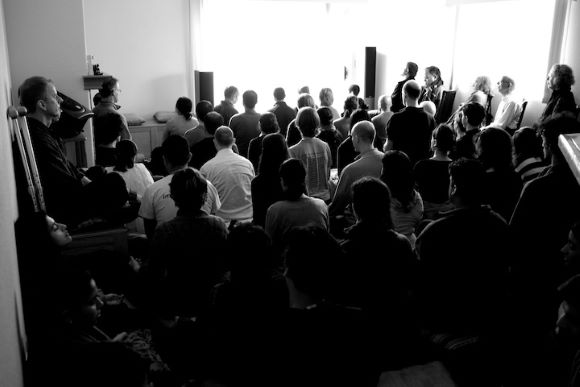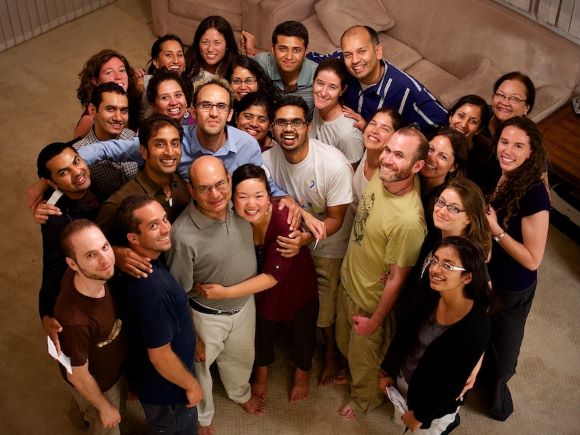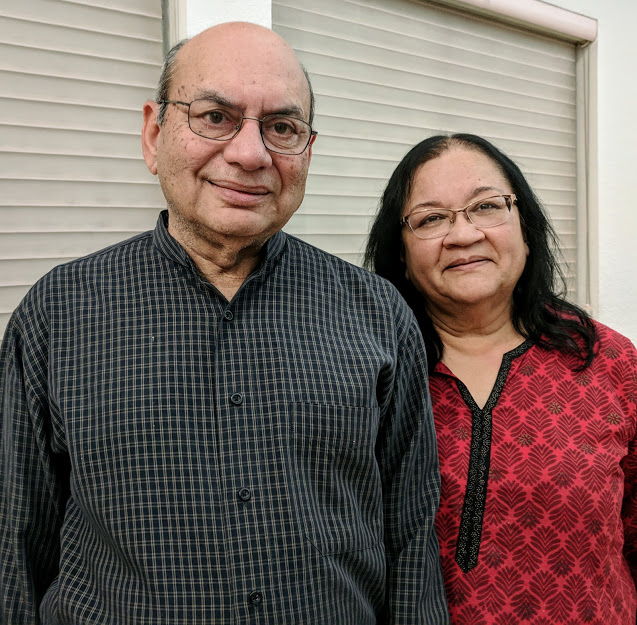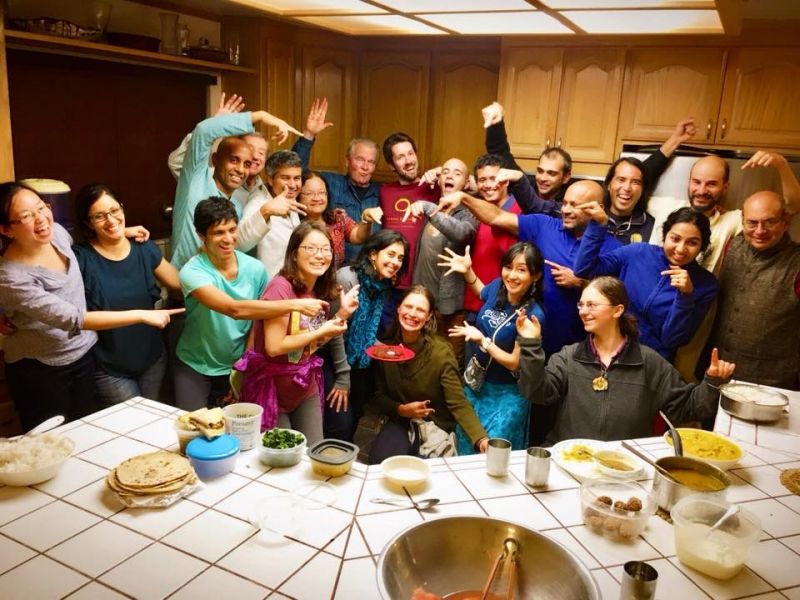About Awakin Circles
Six Lessons (Plus One) From My First Awakin Circle
--Aryae Coopersmith
Have you ever found yourself standing in front of a door with the strange feeling that, if you choose to open it and walk inside, life will never be the same? For me, on a balmy summer evening in 2013 in Santa Clara, California, standing at the front door of the home of Dinesh and Harshida Mehta, I felt that this was one of those moments. I took a deep breath, opened the door, and walked inside.
I was greeted in silence by a man about my age with a calm demeanor and a sweet smile, who put his hands together and bowed to me. This must be Dinesh, I thought. I wasn’t used to being greeted in this way. But I immediately understood his message, so I smiled back, placed my hands together, and bowed to him.
My first Awakin Circle lesson: we share silence here; we acknowledge and honor the divine in each other.
Dinesh silently showed me into the living room. There was a large circle of cushions on the floor, and a few seats on couches and benches against the walls. I felt embarrassed. It had been years since I had sat for any length of time on a cushion on the floor, and imagined it would be quite uncomfortable. On the other hand, who was I to assume the privilege of sitting in one of the comfortable chairs? Dinesh, seeing my dilemma, silently guided me to one of the chairs and invited me to sit.
My second lesson: here we care for each other with kindness and generosity.

What an extraordinary experience that hour of silence was! The mind was wandering to all kinds of places. In the weeks that followed, as I continued to come back week after week, I would gradually come to understand that that was really the point: to learn to observe the wandering mind and emotions without being attached. And to open to something larger. But what was most extraordinary to me, sitting for an hour with a room full of strangers, sharing the space, sharing the silence, sharing the collective energy of which we were all part, was the intimacy. In a way that I hadn’t expected, how connected we all seemed!
My third lesson: the power of simply sitting together in silence.

Then it came time for the circle of sharing. Each week there’s a passage that gets read – eclectically sourced from teachers and people of wisdom around the world – followed by the opportunity for all of us to share our reflections.
There were roughly 50 of us in the room. “How much time do we each have?” the circle anchor asked. “53 seconds!” said Hafiz, smiling.
There would be no signal to each of us when our time was up; we each got to self-monitor. As a life-long facilitator of circles and group conversations, I was interested in how this would work. It turns out that some people spoke way longer than their allotted time, and that made me uncomfortable. I thought, is this fair? How will everyone get their turn?
But what happened was remarkable. When someone would speak for a long time, typically the next several people would speak very briefly, or pass. Most people seemed unattached to how much time they had to speak.
“How does this work?” I asked Nipun later. “My experience is that when one person is long winded, others get nervous and want to claim their space to speak as well.”
Nipun smiled. “When we sit for an hour in silence together, we get connected,” he said. “It may not always be conscious, but our behavior changes. There’s a shift from me to we.” Later I’ll learn that there’s more to it. It’s not only about the hour of silence each week. It’s also about the giving spirit of kindness and generosity with which people here consistently treat each other. It starts with the conscious intention and practice of the Mehta family, and ripples through all of us.
Lesson number four: in a community infused with kindness and generosity, where people sit in silence together, there is less ego and more caring.

Finally there was the third hour, the wonderful meal served to us by Harshida and the team of volunteers working with her in the kitchen. As I got to the front of the line Harshida, whom I had never met before, looked me in the eye, smiled most warmly, handed me my plate of food with both hands, and silently gestured to make sure I had as much of each kind of food as I wanted. Wow! Later, as we were all sitting in silence at the various tables, eating, she and others came around with more trays of food to offer us seconds, and thirds.
Later when I walked up to thank her for her generosity, she simply shrugged and said, “Thank you for coming to our home and spending the evening with us!” Harshida has a full-time job at a bank. Yet somehow, every week for the past 21 years, she’s found the time to clean and prepare her house, and prepare a meal for 50 people. I’ve heard Nipun tell the story many times about how his mother, with complete sincerity, will say to anyone who thanks her, “Thank you for coming to be with us!” Why? Because it is we, her guests, who give Harshida the opportunity to serve. Wow!
Lesson number five: for someone totally committed to service to others, giving is it’s own reward.

After the meal there was time for people to interact and speak with each other. I found that, having shared the past three hours with 50 strangers, random conversations happened quite easily that were warm, friendly and comfortable. I was surprised at how quickly these conversations could get deep and intimate, and how those of us from very different backgrounds could discover important things we had in common.
Lesson number six: the Awakin Circle tills the soil for beautiful friendships to grow.

My final lesson didn’t arrive until a few weeks later, as I was starting to learn more about the scope of the ServiceSpace community. Awakin Circles all over the world. Global Awakin Calls each week, Karma Kitchen gift-economy restaurant meals all over the world, DailyGood good-news publication, and so much more.
“This is all too much for me to get my mind around,” I said to Nipun. “I don’t understand how it's all happening!”
Nipun laughed. “If you told me you understood ServiceSpace, I’d know you didn’t!”
So I’m learning to live with the wisdom of not always needing to understand. And to pay attention instead to stilling the mind and finding small ways to serve others. And that makes all the difference.